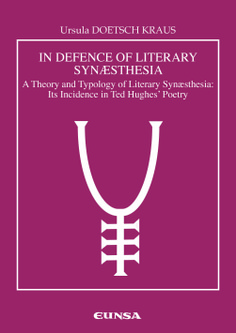In Defence of Literary Synaesthesia
Ursula Doetsch Kraus
The title of the book says it all: an in-depth study of one of the most controversial topics in literary criticism: literary synæsthesia, for which, despite the extensive literature on the subject, no solid definition and classification has yet been found, thus accounting for the persistent confusion which still surrounds it.
Adopting a persistently constructive yet critical perspective, the author establishes clear guidelines as to how to analyse, interpret and classify literary synæsthesia and distinguish it from other figures with which it is often confused, and further shows that literary synæsthesia is composed of two diametrically different categories, the first of which is labelled genuine synæsthesia, the literary synæsthesia par excellence, and the second poetic synæsthesia. The first of these, as she shows at length throughout the work, remains largely unknown to this day.
The book focuses on the disassociation of literary synæsthesia from all types of metaphor, especially synæsthetic metaphor or pseudosynæsthetic metaphor and, above all, from psychological synæsthesia. The cornerstone on which the work is based and which, she insists, must underlie every attempt to analyse this phenomenon, is laid on a prior, thorough, lexical-pragmatic analysis of the elements which compose the expression in question, as well as being dependent on the reader/analysts knowledge of this figure of speech and her understanding of what is being communicated. Without these, no cross-sensory or non-cross-sensory association can be interpreted or determined.
The present treatise is a vital testimony to what literary synæsthesia is and is not, and is intended to contribute to a clear understanding and underpin the reasons for its isolation and analysis, thus filling the apparent gap in current research on literary synæsthesia and thus preventing further misinterpretation and justifying its existence.
An analysis of the literary synæsthesias and other cross-sensory and non-cross-sensory associations to be found in the poetic output of Ted Hughes serves to consolidate and exemplify the theory and typology of literary synæsthesia proposed and defended in this research. The work will, no doubt, bring about a paradigm shift in the recognition, conceptualisation, and treatment of literary synæsthesia.
¿Y si te llevas el eBook por 1,99€? Accede a la versión digital al comprar este libro en papel. Podrás utilizar el cupón de descuento impreso en el interior canjeable en nuestra Biblioteca Virtual
- Escritor
- Ursula Doetsch Kraus
- Colección
- Anejos de Rilce
- Materia
- Lengua y Literatura
- Idioma
- English
- EAN
- 9788431338343
- ISBN
- 978-84-313-3834-3
- Depósito legal
- NA 1024-2023
- Páginas
- 844
- Ancho
- 17 cm
- Alto
- 24 cm
- Edición
- 1
- Fecha publicación
- 02-06-2023
- Número en la colección
- 66
Sobre Ursula Doetsch Kraus (Escritor)
Libros relacionados
La sinestesia en la poesía española
Desde la Edad Media hasta mediados del siglo XIX
Cargando...






